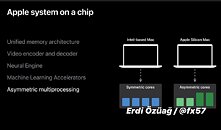Tuesday, July 7th 2020

Apple's Homebrew Mac Processor to Leverage Arm big.LITTLE
The first homebrew processor for Macs by Apple could leverage Arm big.LITTLE technology, according to a slide from a developer-relations presentation leaked by Erdi Özüağ of Donanim Haber. Apple is referring to the setup as "asymmetric cores" in its documentation, although it essentially is big.LITTLE, a technology that's been implemented by Arm SoC vendors since 2012. It combines groups of low-power (high-efficiency) and high-performance (low-efficiency) cores in response to processing demands by software, with the high-performance cores only been engaged when needed. Intel only recently introduced its rendition of this tech, called Hybrid Processing, with its Core "Lakefield" processor, and looks to scale it up with future chips such as "Meteor Lake."
Besides a multi-core big.LITTLE CPU, the Apple SoC features dedicated AI acceleration hardware, including a neural engine and matrix-multiplication hardware (dubbed ML accelerators), a dedicated video hardware encoder and decoder, and memory controller that's optimized for UMA (unified memory) for the iGPU and system memory. Apple has already started shipping Mac Mini prototypes with an Arm-based processor to its ISVs along with a special version of MacOS "Big Sur" and a wealth of software development kit to help port their x86 Mac software over to the new machine architecture.
Source:
Erdi Özüağ (Donanim Haber)
Besides a multi-core big.LITTLE CPU, the Apple SoC features dedicated AI acceleration hardware, including a neural engine and matrix-multiplication hardware (dubbed ML accelerators), a dedicated video hardware encoder and decoder, and memory controller that's optimized for UMA (unified memory) for the iGPU and system memory. Apple has already started shipping Mac Mini prototypes with an Arm-based processor to its ISVs along with a special version of MacOS "Big Sur" and a wealth of software development kit to help port their x86 Mac software over to the new machine architecture.

6 Comments on Apple's Homebrew Mac Processor to Leverage Arm big.LITTLE
The blisteringly fast "Mac SoCs" are just going to be mobile SoCs with higher power envelopes. big.LITTLE architectures serve no purposes in PCs.
The SOCs may not differ from what they use in say their iPhones/ iPads. But given the larger battery and higher power envelope, you may expect to see more cores.
Intel these days is best at adding ++ to their burgeoning process nodes, everything else they seem to botch pretty hard.
And to those saying "what use is this in a PC, it's a waste of time", then you clearly have no idea how modern software works, as well as the fact that these CPUs will mostly be found in battery powered devices.